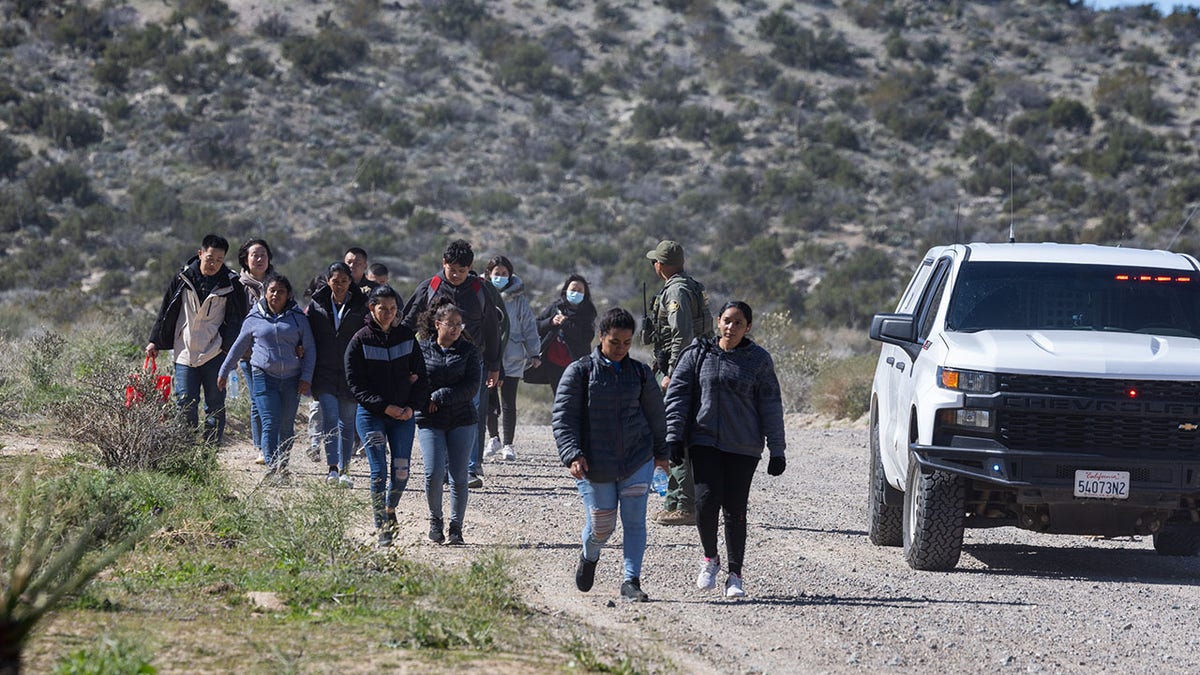Michigan gov warns President Biden could face protesters when he visits
Democrat Gov. Gretchen Whitmer warned on Sunday that President Biden could face protesters when he visits the state amid mounting backlash from progressives over his support for Israel.
Amid growing calls from some Democrats and liberals for President Biden to step aside after his disastrous debate performance last week, Michigan Gov. Gretchen Whitmer has been touted as a possible replacement, raising questions about how she would handle the border crisis.
Whitmer, as a governor of a swing state, has been named as someone who could step into the role of the 2024 presidential nominee for Democrats if Biden were to step down. Previous polling has suggested she would fare the best out of a number of candidates against former President Trump, the presumptive Republican nominee.
Should she receive the nomination and win in November, she would step into a federal leadership role at a time when immigration policy and the ongoing crisis at the southern border are top issues for voters and for the country.
DO THESE POTENTIAL BIDEN REPLACEMENTS HAVE WHAT IT TAKES TO BEAT TRUMP?

Gov. Gretchen Whitmer attends a canvass kickoff in Grand Rapids, Michigan, on Aug. 2, 2022. (Bill Pugliano/Getty Images)
Whitmer has been largely supportive of what President Biden has done in terms of immigration policy. When Biden announced additional restrictions on asylum last month, she issued a glowing statement approving of the move and saying that he is "delivering."
"President Biden’s executive action will help secure our country’s border by making it easier for immigration officers to remove those who are here unlawfully, reducing the burden on our Border Patrol agents. Today’s announcement builds on the president’s work to deploy a record number of border agents and officers to the southern border," she said. "The American people want real solutions, and President Biden is delivering today."
Like other Democrats, she also backed Biden’s broader calls for a comprehensive immigration bill to fix what the administration has called a "broken" immigration system.
CLICK HERE FOR MORE COVERAGE OF THE BORDER SECURITY CRISIS
That plan included sweeping reforms, additional visa pathways, extra funding and a pathway to U.S. citizenship for millions of illegal immigrants. It was rejected by Republicans in part due to the inclusion of an amnesty. Whitmer wants it passed.
"President Biden sent Congress a comprehensive immigration reform plan on day 1 and repeatedly requested more border resources from Congress, only to be blocked by Republicans," she said last month. "They should stop playing political games and work with the administration on a coordinated, bipartisan federal solution to fix our broken system."
Like Biden, she has also been deeply critical of former President Trump’s attitudes toward the border. She previously noted that she sent the National Guard to the border during Trump’s term in office, and she has blamed him for killing a separate bipartisan Senate deal to provide funding for the border.
HOW WOULD A PRESIDENT NEWSOM HANDLE BORDER, IMMIGRATION POLICY?
"He told the Republicans to walk away, and they did," she said in April.

Migrants arrive at a makeshift camp after crossing the border from Mexico near Jacumba Hot Springs in San Diego on Feb. 23, 2024. (Qian Weizhong/VCG via Getty Images)
In the state itself, she has given some indications that she may take a harder line on illegal immigration, certainly tougher than some activists would want.
She has provided multiple National Guard deployments to the border, both during the Trump administration and the Biden administration in support of Texas.
According to her office, she sent 175 personnel between 2020 and 2021, and 37 have been stationed since 2020. She also visited Michigan soldiers at the border in 2022.
BIDEN VOWS TO KEEP WHITE HOUSE, UNDETERRED BY DEMOCRAT PANIC AFTER DEBATE DISASTER
Unlike other potential Democrats, like Calif. Gov. Gavin Newsom, she has taken a hard line against illegal immigrants receiving state benefits. In California, illegal immigrants are eligible for state Medicaid. But Whitmer has shown no sign of echoing that approach.
"If you are here illegally, I do not believe that you should have access," Whitmer said in April, according to the Detroit Free Press.
CLICK HERE TO GET THE FOX NEWS APP
Whitmer has come under fire from some Republicans for a Newcomer Rental Subsidy program, which provides some immigrants up to $500 in rental assistance. However, it is aimed to help asylees, refugees and others who have valid immigration status in the U.S. and explicitly states that those in the country illegally are not eligible for the program.







